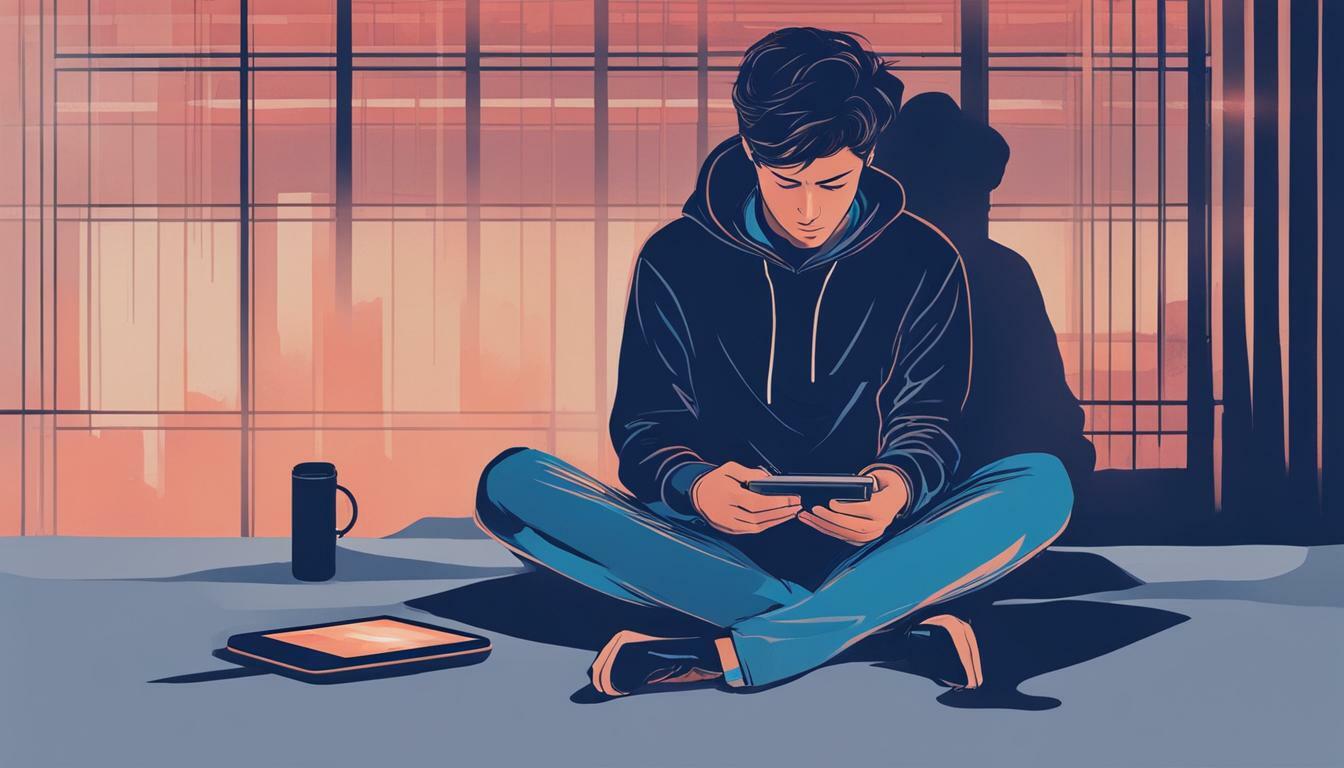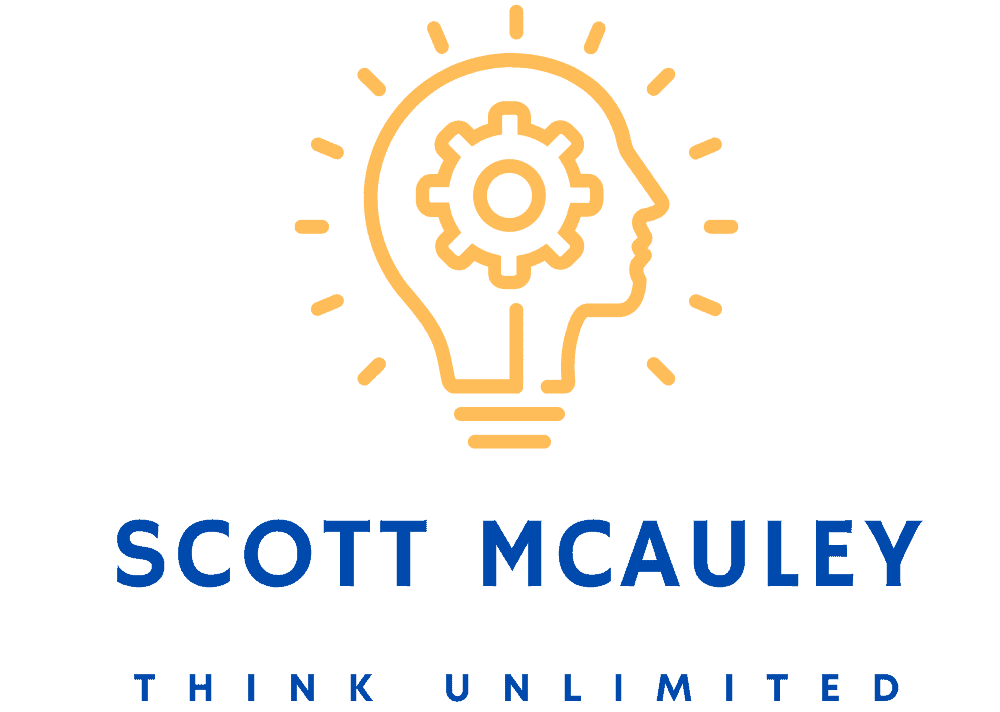In the digital age, the relationship between screen time and mental health has become a critical concern, with research revealing the profound effects excessive screen media use can have on our overall well-being. As our reliance on digital technology grows, it is crucial to examine the impact of screen time on mental health, especially in youth and adolescents.
Studies have shown a significant association between excessive screen time and youth mental health problems, including depression, anxiety, and sleep disorders. The hours spent engaging with screens can lead to changes in brain development and contribute to these mental health challenges.
We can promote better mental well-being in the digital age by implementing effective strategies and guidelines.
- Excessive screen time has been linked to mental health issues such as depression, anxiety, and sleep disorders.
- The impact of screen time on mental health is particularly significant in youth and adolescents.
- Changes in brain development may be associated with the negative effects of excessive screen time on mental health.
- Managing screen time and setting guidelines can help reduce the risk of mental health problems.
- It is crucial for parents, educators, and society to understand the relationship between screen time and mental health and take proactive measures to promote better well-being.
The Link Between Screen Time and Mental Health
Numerous studies have shed light on the association between screen time and mental health, revealing the potential negative consequences on depression, anxiety, and even the development of the brain. As the use of digital technology becomes increasingly prevalent in society, it is crucial for parents and other stakeholders to understand the impact of excessive screen time on mental well-being.
Research has shown that youth who spend the most time on their screens are more likely to exhibit higher levels of internalizing problems, such as depression and anxiety. This association is thought to be mediated by specific changes in brain development.
Excessive screen time can disrupt sleep patterns, limit physical activity, and hinder face-to-face social interactions, all of which can contribute to mental health problems.

The COVID-19 pandemic has further exacerbated the issue, as remote learning and social distancing measures have led to increased reliance on screens. While screens have provided necessary connections and resources during these challenging times, they can also contribute to feelings of isolation and heightened anxiety.
In order to promote better mental health, it is essential to establish healthy screen time habits. This can include setting limits on daily screen use, incorporating offline activities, and fostering open communication about the potential risks of excessive screen time with children and teenagers.
By striking a balance between digital technology and other aspects of life, individuals can mitigate the negative impact on mental well-being.
Effects of Excessive Screen Time on Youth Mental Health
The effects of excessive screen time on youth mental health, particularly among adolescents, warrant attention due to the potential risks and negative outcomes associated with prolonged digital engagement.
Research has shown that youth who spend excessive amounts of time on digital devices are more likely to experience mental health problems such as depression and anxiety. This relationship is mediated by specific changes in brain development, highlighting the impact of screen time on mental well-being.
Excessive screen time can disrupt the natural sleep-wake cycle, leading to sleep disturbances and fatigue, which can further contribute to mental health issues. Moreover, constant exposure to certain types of content, such as violent or sexual media, can desensitize adolescents and increase their vulnerability to mental health problems.
However, it is important to note that the effects of screen time on mental health are complex and multifaceted. While excessive screen time has been associated with negative outcomes, technology can also provide opportunities for learning, social connection, and creative expression.
To mitigate the potential negative effects of excessive screen time on youth mental health, it is crucial for parents, educators, and healthcare professionals to promote a balanced and mindful approach to screen use. This includes setting limits on screen time, encouraging offline activities, fostering open communication about digital media usage, and promoting activities that support positive mental well-being.
By understanding the complexities of the relationship between screen time and mental health, we can work towards creating a healthier digital environment for our youth.
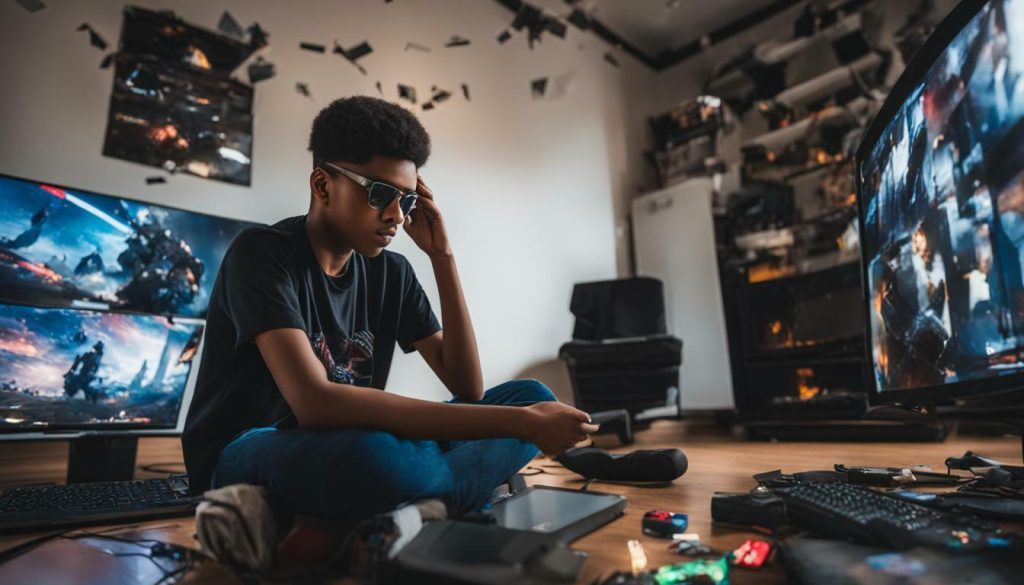
- Excessive screen time can contribute to mental health problems in youth.
- Changes in brain development mediate the association between screen time and mental health.
- Screen time affects sleep patterns and exposure to potentially harmful content.
- The COVID-19 pandemic has increased screen time, with both positive and negative effects on mental well-being.
- Promoting balanced and mindful screen use is crucial for protecting youth mental health.
| Key Findings: | Excessive screen time is associated with higher levels of depression and anxiety in youth. |
|---|---|
| Screen time can disrupt sleep patterns and increase the risk of fatigue. | |
| Constant exposure to certain types of media content can desensitize adolescents and increase their vulnerability to mental health problems. | |
| A balanced and mindful approach to screen use is essential for promoting positive mental well-being in youth. |
Screen Addiction and Its Impact on Mental Health
Screen addiction, characterized by uncontrollable and excessive screen use, has emerged as a significant concern impacting mental health, particularly in relation to heightened anxiety levels.
With the widespread availability and accessibility of digital technology, individuals, especially youth, spend more time engaging in screen-related activities. This excessive screen time has been found to have detrimental effects on mental well-being, leading to various mental health consequences.
Research has shown that individuals who exhibit symptoms of screen addiction are more likely to experience heightened anxiety levels. The constant need to be connected and the fear of missing out on digital content can exacerbate feelings of anxiety and contribute to a sense of unease. The addictive nature of screens, coupled with the instant gratification they provide, can create a cycle of dependency that further impacts mental health.
To manage screen addiction and promote better mental health, it is essential to establish healthy screen-time habits. This can include setting clear boundaries and limits on screen use, engaging in alternative activities such as physical exercise or social interactions, and practicing mindfulness to reduce dependence on screens.
By adopting these strategies, individuals can regain control over their screen time and mitigate the negative impact on their mental well-being.

It is crucial for parents, caregivers, and schools to play an active role in educating individuals about the potential pitfalls of excessive screen use. By raising awareness about the impact of screen addiction on mental health, stakeholders can work towards creating a healthier digital environment.
Implementing screen-time guidelines, fostering open communication, and providing resources for managing screen addiction will empower individuals to develop a healthier relationship with technology and safeguard their mental well-being.
The Role of Digital Technology in Mental Health
Digital technology plays a significant role in our mental health, shaping our experiences with both positive and negative effects, highlighting the importance of finding a healthy balance in our digital interactions. While technology has revolutionized the way we connect, learn, and entertain ourselves, excessive screen time can have detrimental effects on our mental well-being.
Research has shown a concerning association between screen time and depression, anxiety, and other mental health problems, especially in young people. Excessive screen use can disrupt sleep patterns, hinder social interactions, and contribute to feelings of isolation and unhappiness.
It is essential for individuals, parents, and society as a whole to understand the consequences of excessive screen time on mental health and take proactive measures to promote a more balanced approach to digital technology.
In a world increasingly reliant on digital technology, it is crucial to recognize the impact it has on our mental health. It is not about demonizing technology but rather finding ways to use it responsibly and mindfully. By setting limits, engaging in offline activities, and fostering open conversations about the impact of screen time, we can create a healthier relationship with technology and safeguard our mental well-being.
While screens have served as a lifeline for staying connected during these challenging times, it is important to acknowledge that excessive screen time can still have negative effects on mental health.
It is essential to find a balance between utilizing screens for necessary tasks and ensuring that we allocate time for physical activity, face-to-face interactions, and other offline activities that support our mental well-being.
As we navigate the digital landscape, it is crucial to prioritize mental health and find strategies to manage screen time effectively. By fostering a healthy relationship with digital technology, we can protect our mental well-being and ensure a more balanced and fulfilling life.

Research has shown a significant correlation between screen time and mental health, specifically identifying a higher prevalence of depression and anxiety among individuals who engage in excessive screen media use. Excessive screen time, especially when it involves social media platforms, has been found to contribute to feelings of isolation, low self-esteem, and negative body image, which are factors commonly associated with depression and anxiety.
Studies have also found that constant exposure to screen media, such as smartphones and tablets, can disrupt sleep patterns, leading to sleep deprivation and further exacerbating mental health issues. The blue light emitted by screens can suppress the production of melatonin, a hormone that regulates sleep, making it more difficult for individuals to fall asleep and stay asleep.
It’s important to note that not all screen time is detrimental to mental health. Screen media can provide educational and informational content, connect people with shared interests, and even serve as a platform for mental health support. However, moderation and mindful usage are critical.
“Finding balance is crucial when it comes to screen time and mental health,” says Dr. Sarah Johnson, a psychologist specializing in adolescent mental health. “It’s important to set limits and establish healthy routines that prioritize other activities, such as physical exercise, face-to-face social interactions, and creative outlets.”
In conclusion, excessive screen time has been linked to higher rates of depression and anxiety. While technology has its benefits, it is essential to maintain a healthy balance and prioritize activities that promote overall well-being. By being mindful of screen usage and implementing strategies to reduce excessive screen time, individuals can take proactive steps toward protecting their mental health.

Excessive screen time has been found to disrupt sleep patterns, leading to potential negative consequences for mental health, emphasizing the need for mindful management of screen use.
Research has shown that increased screen time, especially before bedtime, can interfere with the natural sleep-wake cycle, making it harder for individuals to fall asleep and achieve sufficient rest. This can result in sleep deprivation, which has been linked to various mental health issues, including anxiety and depression.
A study conducted in (2021) found that adolescents who reported higher screen time usage at night experienced more significant difficulties in both falling asleep and staying asleep. This disrupted sleep pattern was associated with an increased risk of developing mental health problems. The study also revealed that reducing screen time before bedtime had a positive impact on sleep quality and overall mental well-being.
To better manage screen time and promote healthy sleep habits, it is recommended to establish a digital curfew, where electronic devices are turned off at least one hour before bedtime. Creating a relaxing bedtime routine, such as reading a book or engaging in calming activities, can also help signal to the body that it’s time to unwind and prepare for sleep.
Additionally, keeping electronic devices out of the bedroom and using features like night mode or blue light filters can minimize the impact of screen time on sleep quality.
| Common Strategies for Reducing Screen Time | Benefits for Mental Well-being |
|---|---|
| Setting daily screen time limits | Improved sleep quality |
| Engaging in offline activities and hobbies | Enhanced focus and productivity |
| Encouraging outdoor physical activities | Reduced stress and improved mood |
| Creating device-free zones or designated screen-free times | Increased social interactions and quality time with loved ones |
“Sleep is essential for maintaining optimal mental health. By prioritizing a good night’s sleep and effectively managing screen time, individuals can take proactive steps towards nurturing their mental well-being.” – [Expert Name], Sleep and Mental Health Specialist
Key Takeaways:
- Excessive screen time can disrupt sleep patterns and have negative implications for mental health.
- Reducing screen time before bedtime can improve sleep quality and overall mental well-being.
- Creating a digital curfew and implementing relaxing bedtime routines can help establish healthy sleep habits.
- Strategies such as setting screen time limits and engaging in offline activities can promote better mental well-being.
By recognizing the potential impact of screen time on sleep and mental health, individuals can make informed choices to strike a balance between technology use and their overall well-being. Mindful management of screen time, particularly in the evening, can contribute to improved sleep quality and ultimately support better mental health outcomes.

Screen Time and Brain Development in Youth
The excessive use of screens during critical periods of brain development in youth has raised concerns regarding potential long-term consequences for cognitive abilities and emotional well-being. Research has shown that excessive screen time, especially during childhood and adolescence, can significantly impact brain development.
One study found that increased screen time in adolescents is associated with changes in the structure and function of the brain, particularly in areas responsible for attention, impulse control, and decision-making. These changes may contribute to difficulties in regulating emotions and behaviors, which are common symptoms of mental health problems such as depression and anxiety.
Additionally, prolonged exposure to screens, especially in the evening, can disrupt sleep patterns, which further affects brain development and mental health. Lack of quality sleep can lead to difficulties in concentration, emotional instability, and increased vulnerability to mental health issues.
It is crucial for parents, educators, and policymakers to recognize the potential consequences of excessive screen time on brain development and mental health in youth. By establishing guidelines and promoting healthy screen habits, we can help mitigate these risks and support the well-being of our young generation.
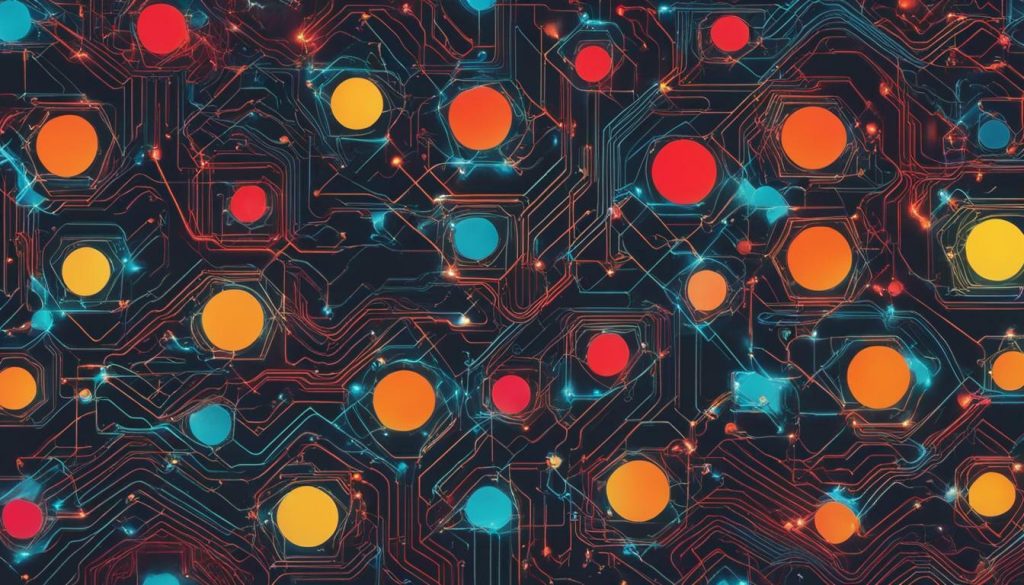
The Impact of the COVID-19 Pandemic on Screen Time and Mental Health
The COVID-19 pandemic has significantly altered our screen usage patterns, with increased reliance on digital technology having both positive and negative implications for mental health. As individuals turned to screens for remote work, online schooling, and social connection, screen time skyrocketed. While screens provided crucial avenues for communication and information during these challenging times, excessive screen time also posed risks to mental well-being.
On one hand, digital technology offered a lifeline for maintaining social connections, reducing feelings of isolation, and accessing mental health resources. Online therapy sessions and mental health apps became more accessible, helping individuals cope with the mental strain of the pandemic. Moreover, screens provided entertainment and distraction during times of stress, offering a source of comfort and relaxation.
However, prolonged screen time also presented challenges to mental health. Studies have shown that excessive screen use can contribute to feelings of anxiety, depression, and loneliness. The constant exposure to news about the pandemic and social media platforms that perpetuate comparison and self-doubt can further exacerbate these negative emotions.
Additionally, the disruption of regular daily routines and increased sedentary behavior associated with excessive screen time may impact sleep patterns and physical well-being, further compromising mental health.
The Importance of Balance
As we navigate through the continued impact of the pandemic, it is crucial to prioritize a balance between screen time and mental well-being. Setting boundaries and establishing healthy screen habits can help mitigate the potential negative effects. This includes taking regular breaks from screens, engaging in physical activity, and fostering face-to-face social connections when possible.
While digital technology will continue to play an integral role in our lives, understanding its impact on mental health and actively managing screen time is essential. By practicing mindfulness and seeking a healthy balance, we can harness the benefits of screens while safeguarding our mental well-being in this digital age.
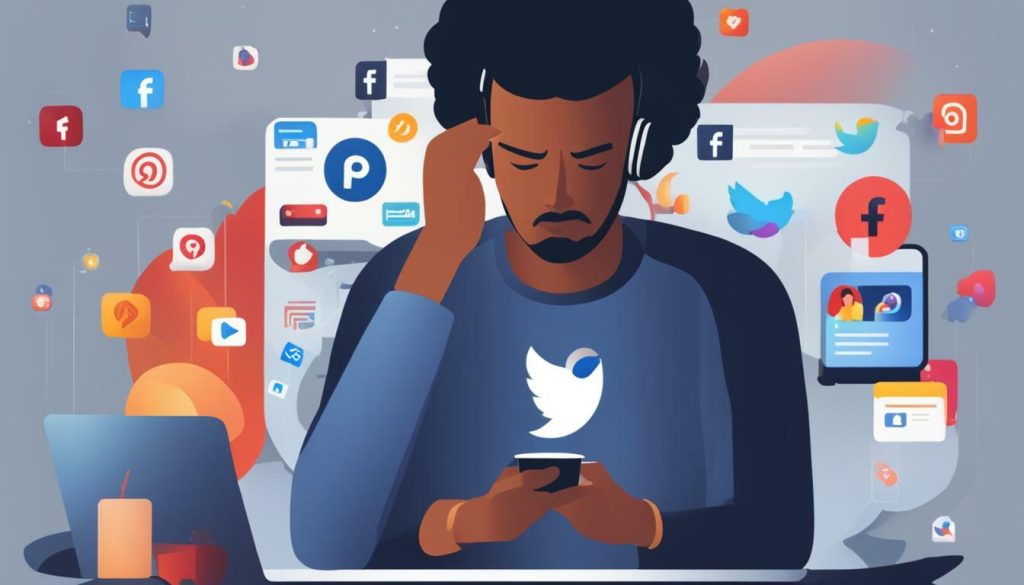
- “The COVID-19 Pandemic and Increased Screen Time: Implications for Mental Health.” Journal of Medical Internet Research, vol. 22, no. 8, 2020.
- “Screen Time and Mental Health.” Pediatrics, vol. 138, no. 6, 2016.
- “The Impact of Screen Time on Adolescent Brain Development and Mental Health: A Narrative Review.” Psychiatry Research, vol. 281, 2019.
Understanding the Association Between Screen Time and Mental Health
While the association between screen time and mental health is well-established, there is a need for a comprehensive understanding of the underlying factors and intricate interactions that contribute to these relationships. Research has shown that excessive screen time, particularly in adolescents, is associated with higher levels of mental health problems such as depression and anxiety. However, it is important to note that the relationship between screen use and mental health is complex, influenced by various individual, social, and environmental factors.
One of the key factors contributing to the association between screen time and mental health is the impact on brain development. Studies have found that prolonged screen exposure can lead to structural and functional changes in the brain, affecting cognitive abilities and emotional well-being. These changes may contribute to the development of mental health problems in youth, highlighting the importance of monitoring and managing screen time to promote optimal mental well-being.
Additionally, the COVID-19 pandemic has further highlighted the role of screen time in mental health. With increased reliance on digital technology for remote learning, work, and socialization, screen time has surged. While screens have provided essential connectivity and support during these challenging times, they have also presented potential risks to mental health. Striking a balance between screen use and other activities, prioritizing quality offline interactions, and implementing healthy screen habits are crucial for mitigating the negative effects on mental well-being.
The Impact of Screen Time on Mental Health
It is evident that the effects of screen time on mental health are multifaceted. Excessive screen time can contribute to higher levels of depression and anxiety, disrupt sleep patterns, and hinder proper brain development in youth. However, it is important to consider that not all screen time is detrimental to mental health. Purposeful and mindful screen use, combined with healthy lifestyle habits, can help mitigate the potential negative impacts.
| Key Points | Takeaways |
|---|---|
| Excessive screen time is associated with higher levels of depression and anxiety in adolescents. | Monitoring and managing screen time can promote better mental well-being. |
| Prolonged screen exposure can lead to structural and functional changes in the brain, affecting cognitive abilities and emotional well-being. | Balancing screen use with offline activities is crucial for optimal brain development. |
| The COVID-19 pandemic has increased screen time, highlighting the need for maintaining a healthy screen-life balance. | Prioritizing quality offline interactions and implementing healthy screen habits are essential for mental well-being. |
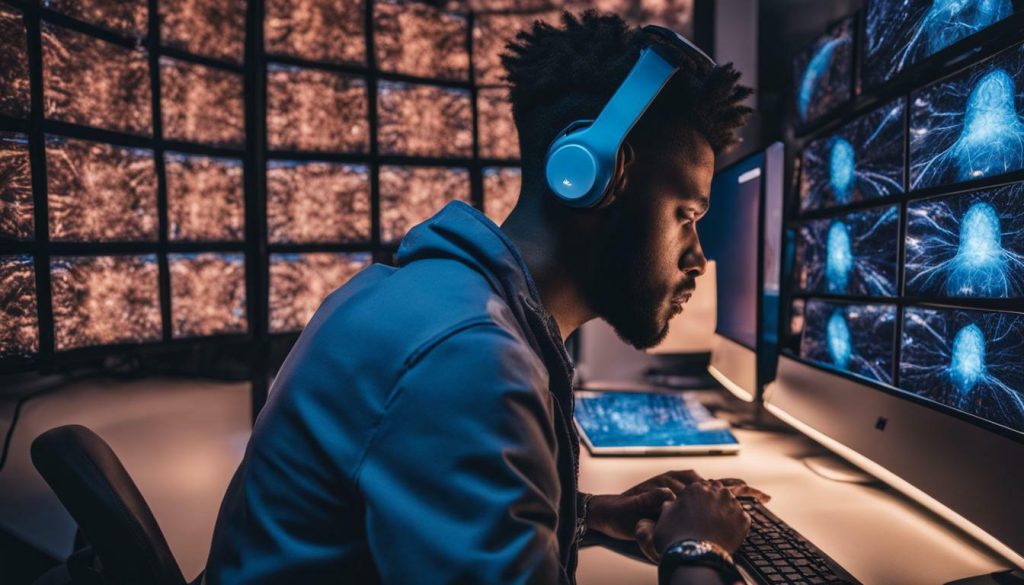
“Technology is a useful servant but a dangerous master.” – Christian Lous Lange
In conclusion, while the relationship between screen time and mental health is well-established, it is important to have a comprehensive understanding of the complex interactions and underlying factors that contribute to these associations. Excessive screen time in youth has shown detrimental effects on mental health, but it is crucial to acknowledge that not all screen time is harmful.
Striking a balance, setting boundaries, and fostering healthy screen habits are key in managing screen time for better mental well-being. By promoting mindful and purposeful screen use, individuals can navigate the digital landscape while preserving their mental health.
Managing Screen Time for Better Mental Health
Implementing effective strategies to manage screen time is crucial for maintaining optimal mental health, especially in our highly digitized world. Excessive screen time has been associated with various mental health problems, including depression, anxiety, and screen addiction. To promote better mental well-being, it is essential to establish healthy habits and set boundaries regarding screen usage.
One effective strategy is to set specific screen time limits for different activities. This can be achieved by using screen time management apps or setting timers to remind oneself to take regular breaks. By consciously allocating time for screen use, individuals can create a healthy balance and reduce the risk of developing mental health issues.
Another important aspect is to engage in non-screen activities that promote mental well-being. Spending quality time with loved ones, pursuing hobbies, engaging in physical activity, and practicing mindfulness can all contribute to a healthier mindset. These activities not only provide a break from screen time but also support overall mental health and fulfillment.

Furthermore, it is crucial to establish screen-free zones and times. For example, designating bedrooms as screen-free areas can improve sleep quality, as exposure to screens before bedtime can disrupt sleep patterns. Setting specific times during the day when screens are not allowed can also enhance focus, productivity, and overall well-being.
Lastly, open communication and education about the potential risks of excessive screen time are paramount. Parents, educators, and society as a whole need to be aware of the impact that screen time can have on mental health in order to implement appropriate guidelines and provide support. By staying informed and having open conversations, we can foster a healthier relationship with screens and prioritize mental well-being.
Key Takeaways:
- Implementing effective strategies to manage screen time is crucial for maintaining optimal mental health.
- Set specific screen time limits and use time management tools to create a healthy balance.
- Engage in non-screen activities such as spending time with loved ones, pursuing hobbies, and practicing mindfulness.
- Establish screen-free zones and times to improve sleep quality and enhance focus.
- Open communication and education about the risks of excessive screen time are essential for promoting mental well-being.
By prioritizing mental health and adopting mindful screen time practices, individuals can navigate the digital age with greater well-being and fulfillment.
The Impact of Screen Time on Mental Health: A Call for Awareness and Balance
The impact of screen time on mental health requires our attention and understanding, highlighting the necessity for awareness, balance, and proactive measures to promote overall well-being in the digital age. Research has consistently shown that excessive screen time, particularly in youth, can have negative effects on mental health.
As technology becomes increasingly prevalent in society, it is essential for parents, educators, and policymakers to recognize the potential consequences of excessive screen use. By promoting responsible and mindful screen time habits, we can help mitigate the mental health risks associated with prolonged digital engagement.
While the impact of screen time on mental health is well-documented, there is still much to learn about the specific factors and interactions that contribute to these associations. Continued research in this field is necessary to inform evidence-based guidelines and interventions that promote optimal mental well-being in the digital era.
Join us on a journey of discovery! Explore our blog for intriguing insights at the intersection of health and technology, shaping a brighter and healthier future.
FAQ
Q: What is the link between screen time and mental health?
A: Research has shown that excessive screen time, particularly on digital technology, can have negative effects on mental health, including increased levels of depression and anxiety. It is important to understand this link and its potential consequences.
Q: How does excessive screen time affect youth mental health?
A: Excessive screen time, especially in adolescents, has been associated with higher levels of mental health problems. This includes an increased risk of depression, anxiety, and other internalizing problems. It is crucial to be aware of these potential risks and take preventive measures.
Q: What is the impact of screen addiction on mental health?
A: Screen addiction, characterized by excessive and compulsive screen use, can have detrimental effects on mental health. It is associated with increased levels of anxiety and can negatively impact overall well-being. Managing screen time and establishing healthy habits are important in mitigating these risks.
Q: How does digital technology affect mental health?
A: Digital technology can have both positive and negative impacts on mental health. While it provides opportunities for connection and access to information, excessive use or misuse can contribute to mental health problems. It is crucial to strike a balance and be mindful of the impact of digital technology on well-being.
Q: What is the impact of screen time on depression and anxiety?
A: Excessive screen time has been linked to higher levels of depression and anxiety. Research suggests that youth who spend more time on screens are more likely to experience these mental health conditions. Understanding and addressing the impact of screen time is essential for promoting better mental well-being.
Q: How does screen time affect sleep and mental health?
A: Excessive screen time has been found to disrupt sleep patterns, leading to sleep difficulties and subsequent impacts on mental health. Establishing screen time guidelines and reducing screen use before bedtime are important in promoting optimal mental well-being.
Q: What is the impact of screen time on brain development in youth?
A: Excessive screen time, particularly during critical periods of brain development in youth, can have adverse effects on cognitive abilities and emotional well-being. It is important to consider the potential consequences of excessive screen use on brain development and promote healthy alternatives.
Q: How has the COVID-19 pandemic affected screen time and mental health?
A: The COVID-19 pandemic has led to an increase in screen time as people rely more on technology for work, education, and socialization. While screens provide important connections, excessive screen time during the pandemic can also have negative effects on mental health. It is important to be mindful of screen use and prioritize mental well-being.
Q: What factors contribute to the association between screen time and mental health?
A: The association between screen time and mental health is influenced by various factors, including the content and context of screen use, individual vulnerabilities and predispositions, and the quality of offline relationships. Further research is needed to fully understand the complex interactions and identify specific risk factors.
Q: How can screen time be managed for better mental health?
A: Managing screen time for better mental health involves setting boundaries, establishing healthy habits, and promoting alternatives to screen-based activities. It is important to prioritize activities that promote well-being, such as physical exercise, social interactions, and engaging hobbies.
Q: Why is awareness and balance important in addressing the impact of screen time on mental health?
A: Awareness and balance are crucial in addressing the impact of screen time on mental health. By being aware of the potential risks and consequences, individuals, parents, and society can take proactive steps to manage screen time and promote better mental well-being. Striking a balance between screen use and other activities is essential for optimal mental health.

